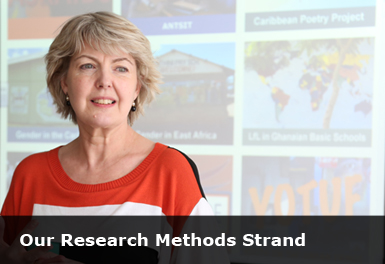An interdisciplinary course on applied linguistics and language education.
Important information
This course is only available as a one-year part-time course to students who have already completed their PGCE at the Faculty of Education. Otherwise, please apply for the full-time course.
| Key Facts | |
|---|---|
| Route Co-ordinator: Yongcan Liu | Full-time enrolled 2024-25: 25 |
| Open to: Full-time MPhil, Part-time PGCE-MEd | Part-time enrolled 2024-25: 3 |
| Full-time deadline: 23/01/2026 | |
| PGCE-MEd deadline: 14/05/2026 | Application Written task |
Overview of the course
The MPhil/MEd Research in Second Language Education (RSLE) is a one-year master's course with a strong focus on research and methodology training. It is designed for students who have a background in language (including English) and seek to develop substantial knowledge and skills in researching language education. A major part of the course involves developing a good understanding of a wide range of research methods in applied linguistics and in social sciences. The course provides an excellent transition to and a valuable introductory experience for full-scale PhD research.
The thematic route adopts a broad definition of the term 'second language education'. It considers issues relating to the teaching and learning of languages (e.g. Arabic, Chinese, French, German, Italian, Russian, Spanish, Urdu) as well as issues relating to the teaching of English as a Second/Foreign/Additional Language across the world. The curriculum covers different phases of education (school, tertiary and lifelong) and various contexts of learning (instructed, self-directed and digital).
A special feature of the course is its broad-based training which enables students to combine linguistic and social analysis in their research. The disciplines and perspectives that are heavily drawn upon in this route include applied/educational linguistics, sociolinguistics, second language acquisition, sociocultural theory, bilingualism in education, and language teacher development.
Why choose us?
What does this course offer?
We aim to combine in-depth critical understanding of the main currents of conceptual thinking in second language education with practical training in conducting L2 empirical research.
You will:
 How is the course organised?
How is the course organised?
The course comprises two strands of modules.
Research Methods Strand (RMS)
The modules in this strand cover various research methods used in social and educational research. These sessions are taught across thematic routes in the Faculty by the research methods team. All sessions are compulsory, but the course is arranged for full and part-time students separately to cater to different needs.
Thematic Route Strand (RSLE)
This strand has four modules which are offered exclusively to RSLE students. The modules cover various topics in applied linguistics and languages education and focus on the themes of Learning, Teaching, Policy and Methodology respectively, providing overall structural coherence to the course. RSLE sessions are scheduled on Mondays and Wednesdays from 2:00 to 6:30/7pm. Part-time PGCE-MEd students are required to complete half of each module and attend the sessions on Wednesdays only.
Please note that students on the MPhil pathway have teaching sessions throughout the week while those on the PGCE-MEd pathway have one teaching session per week on a Wednesday afternoon (2-6:30/7pm).
 Research Method Strand
Research Method Strand
Alongside these modules, you will benefit from Research Methods teaching. This is taught across all thematic Masters within the Faculty of Education, allowing you to interact with others on different courses.
It covers a broad range of social science research methods and is essential for Masters level understanding and critical engagement with the research literature in many specialist areas and in education more generally.
Through this strand you will acquire the skills necessary for designing, conducting, analysing, interpreting and reporting a research study for thesis.
 Who are the course team?
Who are the course team?
The course is staffed by a core team of established members in the University who provide teaching and supervision. Other colleagues also contribute one-off lectures and tutorial support:
Yongcan Liu (route coordinator)
 Where do our students go?
Where do our students go?
We aim to foster future leaders in the field of second language education. Our graduates follow a wide range of professional options, including:
 Before Applying
Before Applying
Please note that this is a popular course and the course is usually oversubscribed well before the deadline. Potential applicants are advised to make early application, preferably by the beginning of December.
Qualifications and experience
Applicants normally have a good BA or MA degree in a language, including English, and an interest in the educational aspects of applied linguistics. Some prior professional experience in second language education is desirable (for instance, in teaching, assessment and teacher training).

